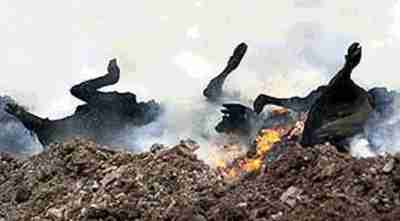In an attempt to increase the 'efficiency' of this process some of the animals' fat will apparently be rendered into biofuel. It is a wonder to me that anybody has the machinery standing idle to perform such a grisly task. Surely the recyclers of used chip fat cannot turn their skills to rapidly towards the unwanted ca
 rcases of animals formerly destined for dinner tables?
rcases of animals formerly destined for dinner tables?The anguish over the 'cull' (aka kill) of animals during the first round of foot-and-mouth was always a mystery to me. Why such an outcry over the deaths of animals bred to be killed and eaten? Where did this mawkish sentimentality come from when those who displayed it were not concerned about tucking into to roast lamb and all the trimmings of a Sunday lunchtime?
Aside from this parade of phoney morality there are some genuine ethical issues raised by this whole debate. First, whether it is ever acceptable to eat the flesh of an animal. I am happy to do that when I know the animals have enjoyed respected during their lives; in the case of my own meat I have known the animals by name and been able to interact with them. Counter-intuitively this makes it easier to eat them rather than harder.
Other difficult questions--as yet unresolved to my satisfaction--revolve around the question of whether a wholly vegetarian lifestyle is more ecologically sustainable. I have not yet seen convincing evidence that the UK could be self-sufficient in food grown without animal or oil-based fertiliser. Too many vegans in the UK today are forced to eat a large range of imported foods, especially beans and pulses.
Then there are the double standards of those who are vegetarian and continue to eat dairy, when the dairy industry is closely tied to the meat industry, since male calves can only be put into the food chain or destroyed (http://www.vegaresearch.org/foodnut_vegani_going.asp).
It seems to me that the central economic problem we face here is the setting of all these questions within an intellectual framework dominated by market and profit. The 'wasteful' slaughter of cattle and sheep during a foot-and-mouth outbreak is entirely market-driven. Vaccinated animals are not acceptable for the export trade, while animals that have survived foot-and-mouth (as most do) will weigh less and therefore generate less profit for the cost of raising them. Since they offer no threat to human health, they could otherwise pass into the food chain as they do in other countries.
In a similar way the Welsh and Scottish hill-farmers are involved in production on an industrial scale that cannot allow for flexibility in terms of the quality of product (slightly older sheep) or when it reaches the market. No doubt the lamb that will be produced over the next few weeks would be welcome to many hungry mouths in this country and abroad. But this would be to 'distort the market'. Similar arguments were made during the Irish potato famine when oats were being exported to feed horses in the UK while Irish people starved.
The story offers yet more reasons why we should explore the ethical underpinnings of the market within which food is produced, which was always a social construct and therefore open to a different system of values and to a radical reconstruction in line with the general welfare, rather than the profit margins of the large-scale businesses who have created the dubious and far-from-free market we operate within today. Tweet
